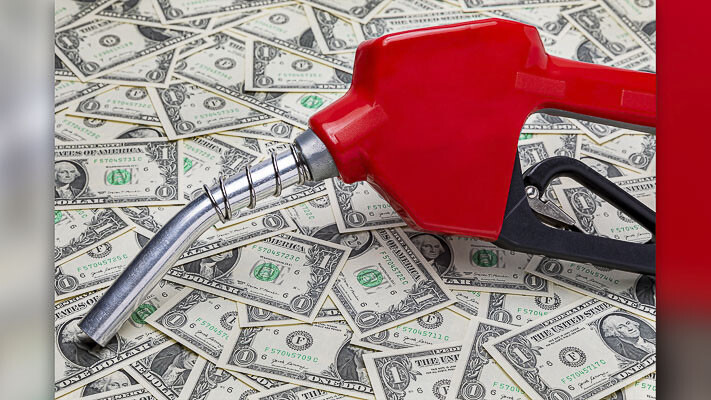
Todd Myers of the Washington Policy Center shares that the impact on prices will appear next year
Todd Myers
Washington Policy Center
There is a great deal of uncertainty about what Washington’s new CO2 tax will cost, but there is an early indication the cost will be, while still expensive, less than feared.

Washington’s new tax on CO2 emissions takes effect Jan. 1. Companies that distribute CO2-emitting fuel sources, like gasoline or natural gas, must purchase permits to cover the emissions from those fuels. Since there are a limited number of permits, the price is determined by an auction. The first auction for permits doesn’t occur until late February. Since the impact on the cost of energy – gasoline, diesel, natural gas – is determined by the cost of the permits, we won’t know how much the tax is until that auction occurs.
The Department of Ecology recently set a minimum price for permits of $22.20 per metric ton (MT) of CO2 and a maximum price of $81.47. That translates to between 18 cents per gallon and 72 cents per gallon.
The Department of Ecology’s own estimate is the permit price would average $58.31 per MT CO2.
We do, however, have an early estimate of what the prices could be. The Nodal Exchange held an auction for futures on the Washington CO2 market for about 25,000 MT of CO2, which is a small percentage of the permits expected to be sold in February. The permits sold for $35/MT, lower than the estimate from the Department of Ecology, but still about 28 cents per gallon of gasoline and 34 cents per gallon of diesel.
These calculations are based on two basic facts. First, each gallon of gasoline emits about 19 pounds of CO2, which is about 0.9% of a metric ton. Multiplying the price per metric ton by 0.9% yields the cost per gallon. Second, we assume the tax will be passed on to consumers. This is the experience in California and in Washington state with gas tax increases.
Importantly, the Department of Ecology’s own analysis of another CO2 regulation – the low-carbon fuel standard (LCFS) – also assumes the cost of compliance will be passed on directly to consumers.
Contrary to that experience from CO2 taxes elsewhere and Ecology’s own LCFS analysis, Ecology claims the new CO2 tax will only increase gas prices by about five cents per gallon. They came to this conclusion by running the total cost of the CO2 tax though a macroeconomic model which estimated the impact on fuel prices would be between 0.67 and 1.9 percent. I asked Ecology to explain how they came to this conclusion or to connect me with the company who did the modeling and they responded only that “Our contract with Vivid (who did the analysis) is now concluded.” So, how they came to that conclusion is not clear.
They also claimed that the “most likely” scenario had a lower price of $41/MT. That scenario, however, assumes Washington’s market is tied in with California’s. Currently, we are not connected to California’s market and, in a recent hearing, Ecology indicated that while they intend to begin negotiations with California, that has not yet occurred, and any agreement would take time. In other words, their “most likely” scenario is entirely theoretical and seems unlikely to occur until later in 2023 at the earliest.
If Ecology believes the cost of CO2 permits will be low, they could ask the legislature to move the maximum price from $81/MT down to $40/MT in 2023 or lower to prevent price shocks. The calculation to set the maximum price is written into regulation, but Ecology staff frequently ask legislators to make changes to the law and certainly could do so here. Leaving the price cap at such a high level indicates Ecology staff believe prices might indeed go higher than they let on.
The bottom line is that there is a great deal of uncertainty. But I am certain that the increased cost at the pump will be more than 5 cents per gallon.
In 2022, Washington’s regular gas prices averaged about 62 cents more per gallon than the national average according to the U.S. Energy Information Administration. I am willing to bet that the gap between Washington’s average price and the national price will be 82 cents per gallon next year.
If Ecology staff, legislators, or others think the impact of the CO2 tax will be small, they should leap at the opportunity to bet on the numbers. I offer my standard bet of $50 to charity. I’ll accept the first two bets.
Either way, the speculation will soon be over and the impact on prices will begin to appear next year.
Todd Myers is the director of the Center for the Environment at the Washington Policy Center.
Also read:
- POLL: Why did voters reject all three tax proposals in the April 22 special election?Clark County voters rejected all three tax measures on the April 22 special election ballot, prompting questions about trust, affordability, and communication.
- Opinion: The war on parental rightsNancy Churchill argues that Olympia lawmakers are undermining voter-approved parental rights by rewriting key legislation and silencing dissent.
- Opinion: An Earth Day Lesson – Last year’s biggest environmental victories came from free marketsTodd Myers argues that Earth Day should highlight free-market solutions and grassroots innovation as more effective tools for environmental stewardship than top-down mandates.
- Opinion: Time to limit emergency clauses and give voters a choiceTodd Myers urges the governor to remove emergency clauses from bills that appear intended to block voter input rather than address real emergencies.
- Letter: C-TRAN Board improper meeting conductCamas resident Rick Vermeers criticizes the C-TRAN Board for misusing parliamentary procedure during a controversial vote on light rail.










